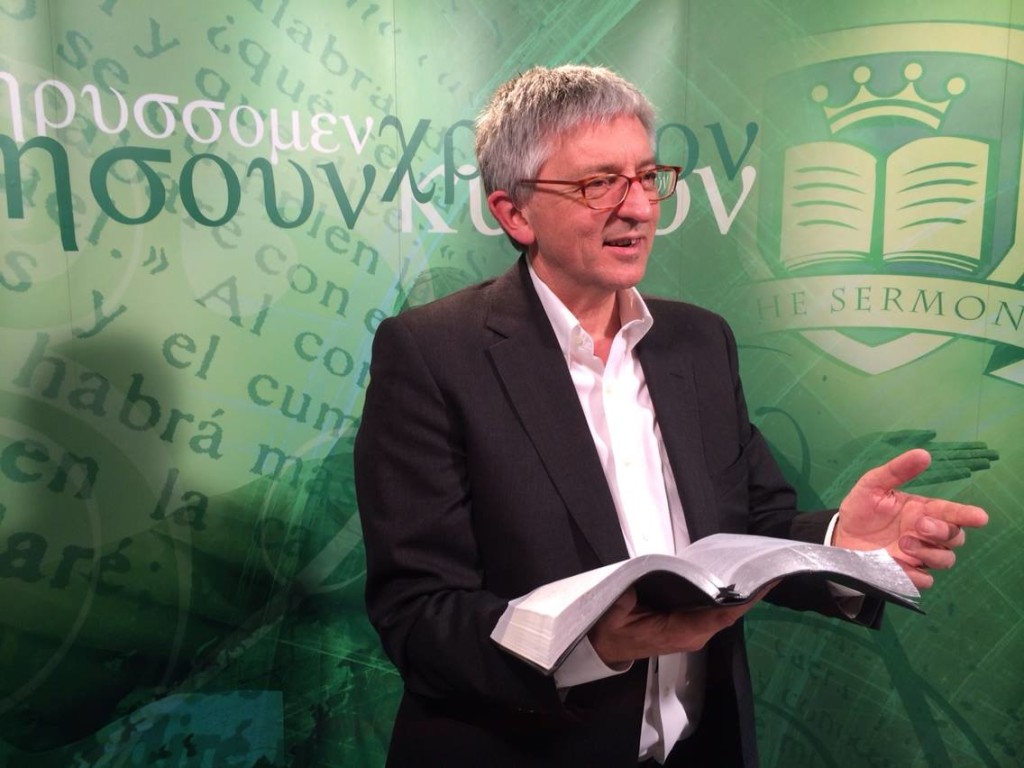Category Archives: Anglicanism
Beware False Teachers
Beware False Teachers (2 Peter 2:1-12) from Stephen Sizer on Vimeo.
Twenty years ago this Summer, the Church in England was gripped with speculation about revival. John Arnott, the pastor of Toronto Vineyard church, was apparently searching for “a fresh spiritual anointing” and attended a meeting led by Benny Hinn, a neo-Pentecostal “Faith teacher”. Benny Hinn’s particular emphasis is upon a powerful “anointing” he is able to bestow simply by blowing on people. Arnott and Hinn had known each other for many years in Toronto and at that time Arnott had “longed for a similar kind of empowerment” as Hinn demonstrated. A year later, Arnott was also attracted to the “holy laughter” ministry of Rodney Howard-Browne. Randy Clark, another key figure in the Airport Vineyard Renewal apparently received his anointing through Rodney Howard-Browne at Kenneth Hagin’s “Rhema” church. The unusual manifestations which occurred in Toronto, occurred after a visit by Rodney Howard-Browne. Subsequently, the manifestations of hysterical laughter, growling, shaking, and falling associated with Howard-Browne and Hinn’s ministry were experienced by others who visited Toronto from around the world including the UK. Advocates of the Toronto Blessing implied, or explicitly stated at the time, that they believed this to be evidence of revival. Speaking at a Wembley meeting with Rodney Howard-Browne on 13th December 1994, Gerald Coates testified, “This is perhaps the greatest outpouring of God in our land ever.” Evangelicals Now, (February 1995, p.9).
Now it is important to note that the noun “revival” does not actually appear in the Bible. The verbs “revive” and “reviving” are used, in the Old Testament, to describe the action of God following his punishment, and His people’s repentance (Psalm 80:18; 85:6, Isaiah 57:15; Hosea 6:2). In Psalm 19:7 it is associated with the Law of God and in many verses in Psalm 119 with meditating on the Word of God.
As the manifestations of hysterical laughter, animal noises and uncontrollable shaking were causing a good deal of controversy and division, in December 1994, I was asked to debate with Sandy Millar and Nicky Gumbal before the Church of England Evangelical Council on the significance of the “Toronto Blessing”.
Jesus on Marriage
 The secret to newlywed bliss? Irrational optimism about your spouse. If marriage is about compromise, as they say, then happy marriage is about self-delusion. So found scientists at the University of Buffalo, who followed 222 newlyweds through their first three years together. The ones who went into marriage idealizing their partners ended up happier together than those who went in with clearer eyes. …
The secret to newlywed bliss? Irrational optimism about your spouse. If marriage is about compromise, as they say, then happy marriage is about self-delusion. So found scientists at the University of Buffalo, who followed 222 newlyweds through their first three years together. The ones who went into marriage idealizing their partners ended up happier together than those who went in with clearer eyes. …
The study is published in the April issue of Psychological Science, Dr. Sandra Murray, a professor of psychology at the University at Buffalo, the State University of New York recruited 222 couples as they applied for their marriage licenses in Buffalo, N.Y. They were, on average, about 27 years old, with family incomes of about $40,000 to $70,000 a year. One hundred and ninety three couples “finished at least three of the seven waves of evaluation, she said. (Eleven separated or divorced.) Participants completed surveys about themselves, their partners and their marriages every six months for three years.”
“The couples who initially idealized their partner extremely, experienced no declines in satisfaction in their partner. As long as both spouses have a positive attitude about their partner, they have likely to have a successful marriage and be very happy together.” (Source: Contracept.org)
Is there an alternative to irrational optimism and rational cynicism in relationships? I believe there is. In our series on the privileges of church membership the last sentence reads:
“To uphold the standard of marriage entrusted by Christ to his Church and to care that children are brought up to love and serve the Lord.”
Jesus on Marriage from Stephen Sizer on Vimeo.
Associate Vicar at Christ Church: Wanted


See here for the ministry and person spec
Church Membership 1: To Follow the Example of Christ
My name is Sonia. I am quite religious. I think there are many ways to God. I think it is very intolerant to insist your religion is right. Although I don’t go to church I regard myself as a good Christian. I give to charity and do my bit for society. It doesn’t matter what you believe as long as you are sincere.
My name is Percy. I am a Christian. I believe in God but I think faith is a personal matter. I do have a Bible and if I had more time, I’d probably read it. I go to church occasionally but find it a little boring and irrelevant. I prefer to dialogue with friends online about religious issues. I think you should live out your faith in what you do.
My name is Delia. I am an Anglican. I have been baptised and confirmed and was brought up to go to Church on Sundays. I find meaning and comfort in the liturgy, the choir and the church calendar. Taking communion is important to me. If I ever have a question, I can always ask my priest. My faith provides me with security in a changing world.
My name is Sebastian. I believe in Jesus Christ. I prayed to receive him when I was a student at university. I pray every day and read my Bible occasionally. I get to Church maybe once a month but I have a busy weekend schedule. There’s golf, the family to see and the shopping. Most people at work know that I am a Christian.
My name is Freddie. Jesus is my Lord and Saviour. Church? I wouldn’t be anywhere else on Sundays. It’s my family. I can’t wait to be with them. We share our lives together, the joys and sorrows. Mid week we have a Bible study group. We support and pray for one another other. They give me the strength to share my faith and work. By God’s grace, he has used me to lead others to Jesus Christ.
Membership 1: To Follow the Example of Christ from Stephen Sizer on Vimeo.
Jesus and the Torah
I was recently with Vivid Broadcast, Broadbridge Heath, Sussex, to record six of my sermons on ‘Christ in all the Scriptures’ for ‘The Sermon‘ a ministry of Richard Bewes.
Genesis: Jesus and Abraham’s Sacrifice
Exodus: Jesus and the Passover Lamb
Leviticus: Jesus and the Atonement Sacrifice
Numbers: Jesus and the Bronze Snake
Deuteronomy: Jesus and the Prophet
Joshua: Jesus and the Commander of the Lord’s Army
View the whole series so far here
Vivid have recently won the contract to record the Antique Roadshow.
What are we to make of Jesus Christ?

When I was a child, I used to read the Daily Mail newspaper every day – well, the Peanuts cartoons, to be precise. I still remember when Lucy asked each of her friends whether she should have her ears pierced. The conversation went on for days. Schroeder was playing his piano. “Do you think I should have my ears pierced?” He replies, “I don’t mind, you pierced mine long ago.” She storms off. “Linus, Do you think I should have my ears pierced?” “I have a better idea…” he replies cheekily, “Why don’t you have your mouth boarded up?” Lucy wallops him. When he comes to, he reflects, “It was worth it!”

How do you cope with people who just don’t seem to like you? No matter how hard you try to be nice to them, they will always twist your words, they question your motives, they gossip about you, they try and discredit you, they seem to undermine you at every opportunity. Maybe you work with them, maybe they live next door, or maybe you are related. How do you deal with them? Blank them out? Retaliate? Stoop to their level? Do you go on the defensive? How do you react?
As we approach Easter, in the first of our new teaching series, entitled The Passion of Jesus, we see how Jesus dealt with his enemies. We see his passion for them. When they ask what appear to be innocent questions, Jesus responds with a question of his own:
“What do you think about the Messiah?” – “who is he?” (Matthew 22:41). Implicit in that question are two more, “Why did Jesus come?” and What is his claim on our lives?”
What are we to make of Jesus Christ? from Stephen Sizer on Vimeo.
The Liberty of Grace
 The Liberty of Grace – and Why the Church is Persecuted (Galatians 5)
The Liberty of Grace – and Why the Church is Persecuted (Galatians 5)
Last Sunday while we were holding our service, Islamist militants “slaughtered” some 30 churchgoers in north-eastern Nigeria. The Bishop of Yola told the BBC the insurgents had locked the church and “cut people’s throats” in Waga Chakawa village, Adamawa state. On the same day, militants also attacked Kawuri village in neighbouring Borno, killing 52 people. Both assaults were blamed on the Boko Haram group. The name means “Western education is forbidden” – is especially active in the north-east of the country. Boko Haram wants to impose a severe form of Islamic law, and has been blamed for thousands of deaths in Nigeria.
The Liberty of Grace from Stephen Sizer on Vimeo.
The Bishop of Yola, Mamza Dami Stephen, said parishioners described how the insurgents had arrived on trucks and locked the church “towards the end of the service”. “Some people tried to escape through the windows and the [attackers] shot at them,” the bishop said. The militants set off bombs, before burning houses and taking residents hostage during a four-hour siege. The bishop said locals were gripped by terror. “Everybody is living in fear,” he explained. “There is no protection. We cannot predict where and when they are going to attack. People can’t sleep with their eyes closed.” Open Doors asks us to pray for God’s comfort and grace to reach all affected by these tragic incidents and that there will be an end to this cruel war against the people of Nigeria, and Christians in particular. But what happened in Nigeria last Sunday should not surprise us. This is the Open Doors 2013 Watch List.
 Jesus said, “If you hold to my teaching, you are really my disciples. Then you will know the truth, and the truth will set you free.” (John 8:31-32). But the truth is dangerous for many in our world today. And Christians in the South and East, it seems, are willing to pay the price to stand for Jesus. Yet in the West, we have domesticated Him. We don’t necessarily see the link between truth and freedom. We probably don’t experience opposition to our faith on a daily basis. So we take freedom for granted and we are liable to compromise the truth. When was the last time you brought Jesus into a conversation at a dinner party or meal with friends or neighbours? Die for Jesus on the streets of Virginia Water? I don’t think so. Hard to imagine. In November each year, we pause for two minutes silence to remember the names of people from Virginia Water who gave their lives to preserve our freedoms and defend us from fascism and totalitarianism. Imagine if those lists were the names of Christian brothers and sisters from our church family who had given their lives in the service of Christ? Would we honour them differently? What of those Christ followers in Syria, Iraq, Iran, North Korea, and many parts of the world, for whom the persecution Paul writes of in our passage today is the norm. Can we take it for granted that it won’t happen in our country?
Jesus said, “If you hold to my teaching, you are really my disciples. Then you will know the truth, and the truth will set you free.” (John 8:31-32). But the truth is dangerous for many in our world today. And Christians in the South and East, it seems, are willing to pay the price to stand for Jesus. Yet in the West, we have domesticated Him. We don’t necessarily see the link between truth and freedom. We probably don’t experience opposition to our faith on a daily basis. So we take freedom for granted and we are liable to compromise the truth. When was the last time you brought Jesus into a conversation at a dinner party or meal with friends or neighbours? Die for Jesus on the streets of Virginia Water? I don’t think so. Hard to imagine. In November each year, we pause for two minutes silence to remember the names of people from Virginia Water who gave their lives to preserve our freedoms and defend us from fascism and totalitarianism. Imagine if those lists were the names of Christian brothers and sisters from our church family who had given their lives in the service of Christ? Would we honour them differently? What of those Christ followers in Syria, Iraq, Iran, North Korea, and many parts of the world, for whom the persecution Paul writes of in our passage today is the norm. Can we take it for granted that it won’t happen in our country?
Ten Commandments for Worship
 I modestly suggest ten rules for the introduction of new music without pain, if sensitivity and careful explanation are used in the exercise.
I modestly suggest ten rules for the introduction of new music without pain, if sensitivity and careful explanation are used in the exercise.
- The best in traditional hymnody should be preserved and used. Much modem worship may supplement the old, but it cannot possibly replace it.
- New songs should be biblical in emphasis and in actual wording.
- Heavy use should continue to be made of the Psalms (in one form or another). This is our only God-given hymn book.
- The music should be appropriate to the words. This is easier to feel than to define—but we all know when it happens, and when it doesn’t.
- There should be a judicious mixture of styles, age, rhythm, length of hymns, shortness of songs, etc.
- At least some of the hymns and songs should be credal, confessional and Christological (ie stating the great facts that we believe, especially about Jesus). Traditional examples are ‘At the name of Jesus.’ Splendid modern examples are ‘These are the facts as we have received them’, ‘Jesus is Lord! creation’s voice proclaims it’, and the more brief ‘God has highly exalted Jesus’.
- At least one hymn or song should be trinitarian (ie proclaiming the persons of the Godhead and what they mean to us). Traditional examples are ‘Thou whose almighty word’ and ‘God is in his temple’. It is significant that many of the modem songs are specifically trinitarian: ‘Holy, holy, holy is the Lord’, ‘Father, we adore You’, and ‘Father, we love You’ to quote but a few.
- There should be a balanced mixture of the objective (what God is, whether anyone believes it or not) and the subjective (how we feel about it and what we experience when we believe it).
- Use the right instruments for the appropriate words.
- If you can’t find any modern hymns to fit your sermons, there’s probably something wrong with your sermons. If you have the same problem with traditional hymns, quit preaching.
Richard Bewes Joins Christ Church Team
 We are delighted to announce that Richard Bewes OBE, the former Rector of All Souls, Langham Place, will be joining the preaching team at Christ Church. Richard and his wife Pam, moved to Virginia Water in December and have joined Christ Church family.
We are delighted to announce that Richard Bewes OBE, the former Rector of All Souls, Langham Place, will be joining the preaching team at Christ Church. Richard and his wife Pam, moved to Virginia Water in December and have joined Christ Church family.
Following the fruitful ministry of John Stott and Michael Baughen, as leader of All Souls, the international nature of the congregation (embracing some 70 nationalities) continued to develop with some 2,500 attending every Sunday. During Richard’s time, the facility to listen to sermons online was achieved, and a ‘virtual weekly global internet congregation’ stands as one of the many legacies of his time in post.
He chaired the Church of England Evangelical Council throughout the 1990s. Stepping down from All Souls in November 2004, Richard was awarded the OBE by the Queen in the New Year of 2005.
Richard has been strongly involved with the evangelistic and humanitarian work of African Enterprise, and is also on the British Board of The Billy Graham Evangelistic Association and its sister work of Samaritan’s Purse.




